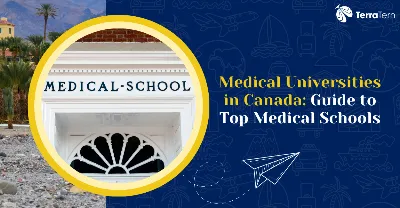Key Highlights
- Top 10 Medical Universities in Canada 2025: Updated List
- What are the Admission Requirements for Medical Universities in Canada 2025?
- What are the Tuition Fees for Medical Schools in Canada in 2025?
- What are the Visa Requirements for International Medical Students in Canada in 2025?
- What are the Scholarships for Medical Students in Canada 2025?
- What are the Career Prospects After Medical School in Canada 2025?
- Why Choose Canada for Medicine in 2025?
- What are the Challenges of Studying Medicine in Canada for International Students in 2025?
- Tips to Increase Your Chances of Admission in 2025
- Conclusion
Canadian medical schools are recognised as having academic excellence, are often known to be innovative in their research and provide the highest standard of healthcare training in the world. Canada remains on the short list of the most popular countries in which to study medicine, drawing thousands of students worldwide yearly. For international students, studying medicine in C gives them a global acknowledgement of their degrees and access to global clinical centres, cross-cultural exposure, and bright career opportunities.
Today, there are 18 accredited LCME-based medical schools in Canada, distributed among provinces such as Ontario, Quebec, British Columbia, Alberta and Nova Scotia. Such universities are also associated with some of the most renowned teaching hospitals in the world, where students can have a hands-on learning experience in a real clinical setting.
What is so appealing about Canada? Here are some key facts:
-
The World Health Organisation (WHO) acknowledges the Canadian MD degrees, which allow their graduates to take medical licensing examinations in the US, UK, Australia, and other countries.
-
Canadian medical schools are competitive since their average acceptance rate is 7.2%.
-
The median GPA is approximately 3.7 +, and most schools also demand high MCAT scores.
-
International students pay a higher tuition between CAD 38,000 and CAD 95,000 annually, depending on the province and the university.
-
Based on specialisation, Canadian physicians are ranked as some of the best-paid doctors in the world, with an average earnings of CAD 150,000 -CAD 450,000 per year.
This blog has the complete list of medical universities in Canada in 2025. We will discuss the highest-ranked schools, their admission criteria, tuition, scholarships, career prospects, and frequently asked questions to make the optimal choice regarding your future in medicine.
Also Read: A Comprehensive Guide to Express Entry Canada
Top 10 Medical Universities in Canada 2025: Updated List

Here’s a detailed list of the top medical universities in Canada in 2025, based on QS World Rankings, Times Higher Education, research output, and student feedback.
1. University of Toronto – Faculty of Medicine
Here are the details for the University of Toronto as part of the best medical universities in Canada:
-
Location: Toronto, Ontario
-
Ranking (2025): Number 1 in Canada, number 5 in the world in clinical medicine.
-
Tuition (International): CAD 91,760/per annum.
-
Program Length: 4 years
-
Admission conditions: 3.8 GPA, 125 overall MCAT.
-
Highlights:
-
Part of the Toronto General and SickKids Hospital.
-
Most powerful research financing in Canada.
-
Has more than 30 residency programmes.
-
Massive network of alumni around the world and high residency
2. McGill University – Faculty of Medicine and Health Sciences
Here are all the details for McGill University, one of the best medical universities in Canada:
-
Location: Montreal, Quebec
-
Ranking (2025): #2 in Canada
-
Tuition (International): CAD 50,000 -60,000/year.
-
Program Length: 4 years
-
Admission Criteria: 3.7 GPA or MCAT in case of international students.
-
Highlights:
-
Researcher in neuroscience and immunology.
-
McGill University Health Centre is a teaching hospital.
-
Bilingual education (English and French).
-
Reduced fees as compared to other leading Canadian universities.
3. University of British Columbia (UBC) – Faculty of Medicine
Here are all the details for UBC as one of the best medical universities in Canada:
-
Location: Vancouver, British Columbia.
-
Ranking (2025): #3 in Canada
-
Tuition (International): CAD 50,000 to DD 70,000/year.
-
Program Length: 4 years
-
Highlights:
-
Largest class size medical programme in Canada.
-
Cancer research and global health powerhouse.
-
There were four rural and urban training campuses.
4. McMaster University – Michael G. DeGroote School of Medicine
Here are all the details for McMaster University, one of the best medical universities in Canada:
-
Location: Hamilton, Ontario
-
Tuition (International): CAD 95,000/annum.
-
Length of programme: 3 years (accelerated programme)
-
Highlights:
-
Innovated problem-based learning.
-
Known as the creator of the Multiple Mini Interview (MMI), used worldwide.
-
Good evidence-based medical research.
5. University of Alberta – Faculty of Medicine and Dentistry
Here are all the details for the University of Alberta, one of the best medical universities in Canada:
-
Location: Edmonton, Alberta
-
Tuition (International): CAD 52,000 -CAD 65,000/year
-
Program Length: 4 years
-
Highlights:
-
Good at diabetes and cardiovascular research.
-
Coline with large hospitals in Alberta.
-
Famous in the field of medical technologies.
6. University of Calgary – Cumming School of Medicine
Here are all the details for the University of Calgary, one of the best medical universities in Canada:
-
Location: Calgary, Alberta
-
Tuition (International): CAD 65,000/per year.
-
Length of programme: 3 years (accelerated MD programme)
-
Highlights:
-
Research-intensive program
-
Close focus on family and rural medicine.
-
The reduced length of degree programmes assists students in joining residency earlier.
7. Queen’s University – School of Medicine
Here are all the details for Queen’s University as one of the best medical universities in Canada:
-
Location: Kingston, Ontario
-
Tuition (Foreign): CAD 60,000-CAD 70,000/year.
-
Program Length: 4 years
-
Highlights:
-
Individualised training and small classes.
-
Close attention to research and clinical rotations.
-
High residency match rates
8. Western University – Schulich School of Medicine & Dentistry
Here are all the details for Western University, one of the best medical universities in Canada:
-
Location: London, Ontario
-
International tuition: CAD 60,000-70,000/year.
-
Program Length: 4 years
-
Highlights:
-
Neuroscience, surgery and medical imaging research.
-
Part of the London Health Sciences Centre.
-
Reputation of being student-friendly.
9. Dalhousie University – Faculty of Medicine
Here are all the details for Dalhousie University, one of the best medical universities in Canada:
-
Constitution: a federation of two provinces in Canada.
-
International tuition: CAD 52,000-60,000/per annum.
-
Program Length: 4 years
-
Highlights:
-
Power in community medicine and rural healthcare.
-
Serves the Maritime provinces
-
Reduced classes and individualised mentorship.
10. University of Ottawa – Faculty of Medicine
Here are all the details for the University of Ottawa, one of the best medical universities in Canada:
-
Location: Ottawa, Ontario
-
Tuition (International): CAD 70,000/year
-
Program Length: 4 years
-
Highlights:
-
The only bilingual (English/French) medical programme in Ontario.
-
Close connections with the national healthcare research centres.
-
Pay attention to primary care and population health.
Here’s a table for the same:
|
University |
Location |
Ranking (2025) |
International Tuition (CAD) |
Program Length |
Highlights |
|
University of Toronto |
Toronto, ON |
#1 in Canada, #5 globally |
$91,760/year |
4 years |
High global ranking, top research funding, large alumni network, 30+ residency programs. |
|
McGill University |
Montreal, QC |
#2 in Canada |
$50,000–$60,000/year |
4 years |
Bilingual education (English/French), reduced fees, strong in neuroscience and immunology research. |
|
University of British Columbia |
Vancouver, BC |
#3 in Canada |
$50,000–$70,000/year |
4 years |
Largest class size, powerhouse in cancer research and global health, four rural/urban campuses. |
|
McMaster University |
Hamilton, ON |
Not specified |
$95,000/year |
3 years (accelerated) |
Innovator of problem-based learning and the Multiple Mini Interview (MMI). |
|
University of Alberta |
Edmonton, AB |
Not specified |
$52,000–$65,000/year |
4 years |
Strong in diabetes, cardiovascular research, and medical technologies. |
|
University of Calgary |
Calgary, AB |
Not specified |
$65,000/year |
3 years (accelerated) |
Research-intensive, focuses on family and rural medicine, and allows for earlier residency entry. |
|
Queen's University |
Kingston, ON |
Not specified |
$60,000–$70,000/year |
4 years |
Small classes, individualised training, and high residency match rates. |
|
Western University |
London, ON |
Not specified |
$60,000–$70,000/year |
4 years |
Strong in neuroscience, surgery, and medical imaging research. |
|
Dalhousie University |
Maritime provinces |
Not specified |
$52,000–$60,000/year |
4 years |
Focus on community and rural healthcare, serving the Maritime provinces. |
|
University of Ottawa |
Ottawa, ON |
Not specified |
$70,000/year |
4 years |
Only bilingual (English/French) medical program in Ontario, close to national research centres. |
Also Read: Common Mistakes To Avoid As A Newcomer To Canada
What are the Admission Requirements for Medical Universities in Canada 2025?

Getting into Canadian medical schools is highly competitive, especially for international students. Here’s what you need:
1. Academic Requirements
Here are the necessary academic requirements for admission into the medical universities in Canada:
-
GPA: 3.7+ on a 4.0 scale is competitive
-
Prerequisites: Students must have completed an equivalent of the following courses: Biology, Chemistry, Physics, Organic Chemistry, Statistics, and English.
-
MCAT:
-
Required by most schools
-
Competitive scores: 510+ overall
-
McMaster does not take into account the rest of the CARS section.
2. Non-Academic Requirements
Here are the non-academic requirements for medical universities in Canada:
-
CASPer Test: Tests decision-making ethics.
-
Extra-Curricular Activities: Shadowing, leadership, research, and clinical volunteering.
-
Research Experience: This is highly appreciated, especially in research-intensive schools such as Toronto and McGill.
3. Application Components
Here are the application components for medical universities in Canada:
-
Personal statement or autobiographical sketch.
-
Recommendations (2 or 3 are needed)
-
Resume/CV with research, community work, and leadership.
-
Interviews (MMI or panel interview format)
4. International Student Considerations
Here are the international student considerations for medical universities in Canada:
-
Limited seats for non-Canadians (often <5% of class)
-
Proof of English proficiency (IELTS 7.0+, TOEFL 100+)
-
Financial evidence of tuition + living expenses
What are the Tuition Fees for Medical Schools in Canada in 2025?

Medical universities in Canada’s tuition fees vary significantly:
|
University |
Tuition (International) |
Duration |
Average Total Cost |
Average Total Cost (INR) |
|
University of Toronto |
CAD 91,760/year |
4 years |
CAD 367,000+ |
23,489,112.01 |
|
McGill University |
CAD 50,000 – 60,000/year |
4 years |
CAD 220,000 |
14,080,666.60 |
|
UBC |
CAD 50,000 – 70,000/year |
4 years |
CAD 240,000 |
15,360,727.20 |
|
McMaster University |
CAD 95,000/year |
3 years |
CAD 285,000 |
18,240,863.55 |
|
Calgary |
CAD 65,000/year |
3 years |
CAD 195,000 |
12,480,590.85 |
Living Costs (Annual Estimate)
Here’s an annual estimate of the living costs:
-
Toronto/Vancouver: CAD 18,000 – 22,000
-
Montreal: CAD 15,000 – 18,000
-
The Smaller Towns (Halifax, Kingston): CAD 12,000-15,000.
Also Read: Immigration To Canada From India: All Different Pathways
What are the Visa Requirements for International Medical Students in Canada in 2025?
International students are required to obtain a study permit and fulfil immigration requirements of Immigration, Refugees and Citizenship Canada (IRCC) in order to be able to study medicine in Canada. The core requirements are:
-
Letter of Acceptance: A known Canadian medical university (Designated Learning Institution).
-
Valid Passport: Should not be less than the entire period of your studies.
-
Evidence of Finances: Bank records or sponsorship that demonstrates that you are able to meet tuition and living costs.
-
Medical Examination: Required for students in the healthcare fields prior to arrival.
-
Evidence of English/French Fluency: IELTS, TOEFL or TEF score, depending on the program.
-
Visa Application Forms: Duly filled study permit application with biometric data.
-
Police Clearance Certificate: To demonstrate good conduct.
-
Validity of Study Permit: Generally equates to the program duration, which may be extended to residency training.
-
Post-Graduation Work Permit (PGWP) Alternative: They can be applied for upon completion of your MD, and help you acquire Canadian work experience.
What are the Scholarships for Medical Students in Canada 2025?
Many Canadian universities offer financial aid and scholarships to international medical students.
Major Scholarships
These are the major scholarships offered by medical universities in Canada:
-
University of Toronto Lester B. Pearson Scholarship-Full tuition coverage.
-
McGill Entrance Scholarships - CAD 3,000 -10,000.
-
UBC International Leader of Tomorrow Award -through academic excellence and leadership.
-
Ontario Graduate Scholarship (OGS) - CAD 15,000/yr.
-
Vanier Canada Graduate Scholarship - CAD 50,000/year (research-oriented)
What are the Tips for Securing Scholarships in Canada 2025?
Here are some tips for securing the scholarships:
-
Maintain a GPA of 3.8+
-
Be a leader and an active member of the community.
-
Develop a good research profile.
-
Apply early (12 months to 9 months in advance of programme start)
What are the Career Prospects After Medical School in Canada 2025?

These are the major career prospects after graduating from medical universities in Canada:
Residency Training
After graduation, the students apply to the Canadian Residency Matching Service (CaRMS). Residency duration varies:
-
Family Medicine: 2 years
-
Internal Medicine: 4 years
-
Surgery: 5–6 years
-
Psychiatry: 5 years
Average Doctor Salaries in Canada
These are the average salaries for a doctor in Canada:
-
Family Medicine: CAD 250,000 – 300,000/year
-
Internal Medicine: CAD 300,000 – 400,000/year
-
Surgery: CAD 400,000 – 500,000/year
-
Anesthesiology: CAD 350,000 – 450,000/year
International Opportunities
These are the international opportunities available:
-
Graduates of Canadian MDs are licensed to work in the US, the UK, and Australia, provided they pass licensing exams (USMLE, PLAB, AMC).
-
Most opt to work in rural or underserved Canadian locations to be better paid and incentivised.
Also Read: Navigating Medical Tests for Canadian Immigration
Why Choose Canada for Medicine in 2025?
These are some reasons why you should choose medical universities in Canada:
-
The best education in the world.
-
Programmes that are based on research and the latest technology.
-
Safe, diverse urban student life.
-
The Canadian healthcare system has a high demand for doctors.
-
Canadian medical degrees are recognised worldwide.
Canada is offering these benefits in comparison to the US, the UK or Australia;
-
Lower than in the US private schools.
-
IMGs have higher residency matches compared to the UK.
-
Good working conditions and good after-study employment.
What are the Challenges of Studying Medicine in Canada for International Students in 2025?

Although considered one of the best medical education programs in the world, international students should remember the challenges in Canada:
-
Very Competitive: Acceptance rates are about 7 per cent, so even good candidates can find it hard to be admitted.
-
Few Non-Canadian Seats: Domestic applicants are favoured at most schools, and fewer than five per cent of the available seats are given to international applicants.
-
Huge Tuition Fees: CAD 38,000-95,000 a year, medical school in Canada is among the most costly in the world for international students.
-
Residency Issues: International graduates are more likely to be readmitted into residency placements than Canadian citizens, even after obtaining an MD.
-
Language: In Quebec, students must be conversant in French to complete clinical rotations.
-
Immigration and Visa restrictions: The issuance and re-issuance of the study permits can be time-consuming and require financial investments and relevant documentation.
Nonetheless, Canada remains the preferred destination for many students due to its unparalleled education quality, international status, and employment prospects.
Also Read: Medical Universities in Germany: Eligibility, Ranking & Fees
Tips to Increase Your Chances of Admission in 2025
Canadian medical schools are among the most challenging schools to enter, so one must be careful with the preparation. The following are some tips you can actually use to increase your chances:
-
The Good Academic Profile: target GPA: 3.8 GPA and good MCAT (510+).
-
Get Clinical Practice: Work, shadow practices in hospitals or medical centres.
-
Acquire Research Skills: Publication or contribution to Research, particularly in immunology, neuroscience or public health.
-
Show Leadership: Volunteer work in one of the following areas: community service, student organisation or community health activity.
-
Pass the CASPer Test: Educate or practice ethical decision-making in situations involving judgment.
-
Practise MMIs: Multiple Mini Interviews are your communication, empathy, and professionalism test. Practiseeock interviews.
-
Apply broadly: Don’t stick to one or two schools. Apply to as many universities as you can.
-
Focus on Diversity and Multiculturalism: Canadian universities cherish diversity in terms of students with different cultures and perceptions.
A blend of academic excellence, extracurricular performance, and other personal attributes can significantly help improve your chances of admission.
Conclusion
A Canadian medical student will have a life-changing opportunity in 2025 to study in medical universities in Canada and have a globally recognised medical career. Canada has the best universities, research facilities, and career options, making it one of the best destinations for all doctors worldwide. The rivalry is intense, and tuition costs are high, but it is worth the money to gain rewarding careers, international opportunities, and chances to make a palpable difference in healthcare. Want to be a doctor? In Canada, the medical universities in 2025 will provide all you require to realise your ambition. Contact TerraTern for more information.






